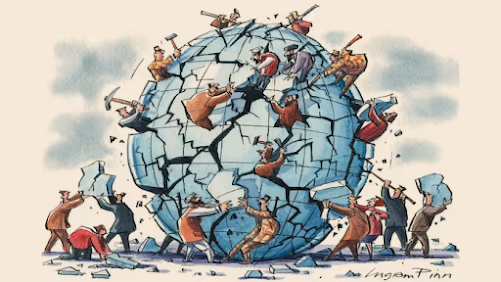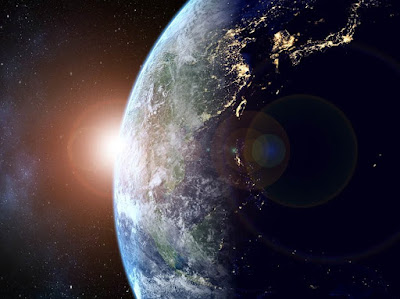2047...
Think ahead to the year 2047...
World 1: identity
This is a world where people place a lot of value on identity. ICT, called "Explore the Unknown", helps people who are meeting each other for the first time to identify the characteristics of their self-identity, such as their political views, their sense of belonging, their art of expressing themselves, and so on, instead of traditional social constructions such as gender, sexual orientation, nationality, and age. Later, people use this ICT to build their communities and the world becomes a decentralized tribe.
Francis Fukuyama argues that the need for recognition acts as a significant historical driver. The recognition of self-identity plays the most important role in human relationships. Fukuyama asserted that there is a component of the soul that longs to be treated with respect, a concept from Plato called thymos. This might be seen as a call for equality (or "isothymia"), the yearning for superiority (megalothymia) is another way it shows up.
It is a bold statement that the #MeToo movement, Donald Trump, and Black Lives Matter are all the same phenomenon. Fukuyama introduces three steps; the first is a philosophical history of the inner self, especially the idea that people should express their inner selves and insist on demanding respect from society, rather than deferring to its judgments.
Fukuyama's second step is to claim that these ideas occupy much of the left, at least in the West, and that they demand justice for oppressed groups. The third is that, in the form of identity politics aimed primarily at whites, this same form of politics has now gained a foothold on the Western right. Its market is not the poorest in society, but those who have declined in relative status - the lower middle or working class, more from rural than urban areas, those who used to think they were at the center of politics but now feel disdained by the elite.
 |
| FINANCIAL TIMES |
World 2: Virtual
A world organized around a collective practice of the interdependence between people and virtual worlds. In this world, cities become empty and people connect with acquaintances, friends, and strangers in virtual worlds. People express political opinions and All the actions and thoughts of people in this world can be done through the virtual world.
Due to the popularity of concepts such as work-from-home and online meetings induced by the global COVID-19 pandemic, people are hungry for the right information to connect effectively and efficiently. Many organizations are scrambling to create virtual meetings and events in order to save time and save on infrastructure budgets. People are starting to adapt to everything about virtualization, the use of mobile devices is everywhere and everything, and young children now have unprecedented access to mobile media technologies, youth are shopping, touring, having virtual clothing, showcasing themselves through APPs such as Tik-Tok, and playing virtual-reality games which all takes places in the virtual world. They enjoy their idealized selves and build their idealized worlds to connect with people. Things matter when they can be posted online to perfect their online personas. Then maybe things do not play an important role eventually when they are not in the virtual world.
 |
| virtual world |
The next 25 years?: future scenarios and future directions for education and technology
K. Facer, R. Sandford 12 January 2010
Facer & Sanford published an article called The next 25 years?: future scenarios and future directions for education and technology, exploring the socio-technical developments that the next 25 years are likely to bring in 2010.
Internet is now being used by 5.07 billion people worldwide, 63.5 percent of the world's population. At the same time, the significance of Web Accessibility has been stressed to guarantee that persons with disabilities can access the internet. People have the opportunity to not control their information landscape through institutions as a result of the advent of mobile and personal technology and the reduction of data storage obstacles. A very recent example of how the personal cloud is viable can be the Chinese protest. A report from MIT Technology Review explained the social phenomenon.
Protests against China's strict Covid control measures have swept social media over the past week, with one Twitter account, @LiTeacherNotYourTeacher, serving as the main source of information. People across China sent protest videos and live updates via private messages to the account, which also posted them on their behalf - careful to keep sources anonymous in a time of widespread fear and uncertainty. They were afraid of revealing their identities online due to the Chinese government's regulations and censorship. In this way, every individual's information and personal clouds can be spread without political censorship and institutions. At the peak of the weekend event, Li received dozens of submissions every second. His Twitter account is now a central hub for information about the protests, gaining more than 600,000 followers in the past week.
In the end, I believe that almost everyone has perceived that our world is moving extremely fast towards polarization and virtualization, will there be anything to stop people from stepping on the end of the Tower of Babel? How can humans understand each other?



Thank you for your sharing. The videos and quotes you provided are too comprehensive to introduce ICT. ICT as a tool to help communication, from the old letter to the present Internet. In the network world, people realize distance-free communication through technology. With the development of science and technology, ICT also makes people more equal. In the past, only those who knew each other's addresses could communicate with each other, and the church only allowed the same group of people to participate. But now ICT can integrate different races, genders and cultures. Maybe later we can communicate across species.
ReplyDeleteHi Margaret, thank you so much for such a comprehensive blog post. I enjoyed how you linked different articles to supplement our understanding of what you were referring to. I do not have an answer to your polarization question, but I share the same concerns 😔. We live in a world of ICTs, which means that information is becoming more and more accessible. However, it also means that we live in an age where we can search for the "right answers." By "right answers," I mean answers we are looking for. We look for solutions that supplement our biases. I think many social media algorithms do not help this cause at all. In a non-political example, I am a kpop fan. Because my social media algorithms know that I like a specific kpop group, they feed more and more of their content to me. From a political aspect, the content people read can be very one-sided. This concerns me a lot because we are slowly blocking out other people's views. This is a tricky question, so I wonder if other resources or studies examine this problem a bit more.
ReplyDeleteMargaret, fantastic post, thank you. Interesting that you bring in Fukuyama - I had not heard anything from him beyond the "end of history" thesis. Weird future we're living in. As grim as you are painting 2047, I think you might be right. It does look pretty bad. And you are very right to make a parallel between polarisation and the tower of Babel: we might, in fact, not be able to speak the same language with people anymore. My question, then, is what can be done to change this trajectory. Our generation needs a life worth living!
ReplyDelete